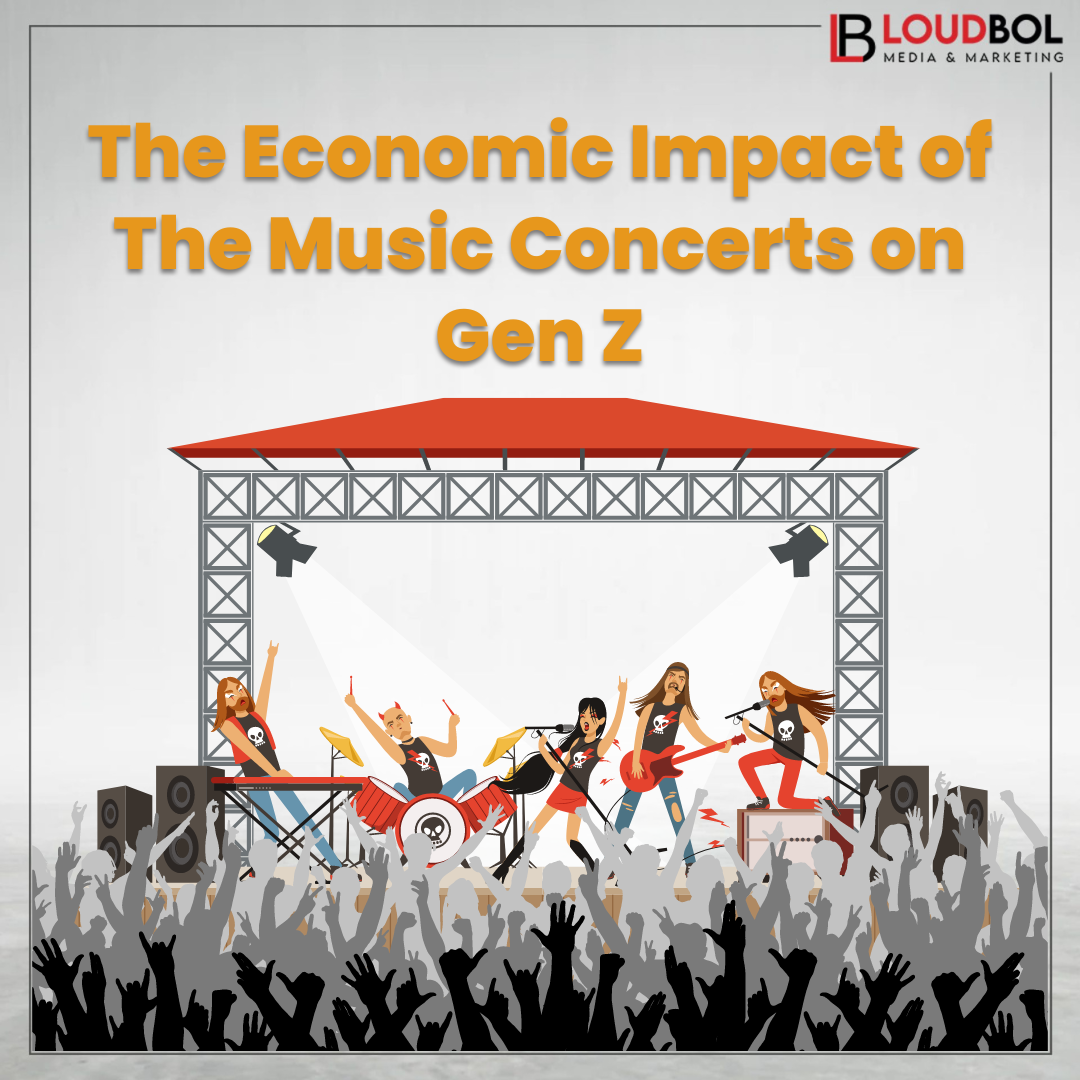In the heart of the digital age, where screens have become our primary windows to the world, the allure of live music has never been stronger. Gen Z, a generation raised on the soundtrack of social media and streaming platforms, has developed a unique relationship with music. Beyond its emotional resonance, music concerts have emerged as a powerful economic force, shaping spending habits and driving consumer behavior. In this blog post we will explore the significant economic impact of music concerts on Gen Z, providing valuable insights for digital marketing agencies seeking to tap into this lucrative demographic.

1. The Concert Culture Buzz: A Gen Z Phenomenon
Gen Z has embraced concert culture with unprecedented enthusiasm. Driven by a desire for authentic experiences and a sense of community, this generation has transformed live music into a social and cultural touchstone. The rise of social media platforms has amplified the impact of concerts, allowing fans to share their experiences, create viral moments, and foster a sense of belonging.
Social Media Influence: Platforms like Instagram, TikTok, and Snapchat have become integral to the concert experience. Fans use these platforms to document their adventures, share behind-the-scenes glimpses, and connect with fellow attendees. This social media buzz can significantly influence ticket sales and create a sense of FOMO (fear of missing out).
Celebrity Culture and Fandom: Gen Z’s fascination with celebrities and fandom plays a crucial role in driving concert attendance. Artists with strong social media followings and engaged fan bases can sell out shows in record time.
2. The Economic Ripple Effect of Concerts
Music concerts have a far-reaching economic impact, extending beyond the immediate ticket sales. They create a ripple effect that benefits various industries and local economies.
Tourism and Hospitality: Concerts attract visitors from far and wide, boosting tourism revenue. Hotels, restaurants, and other hospitality businesses experience increased demand during concert weekends. This influx of tourists can provide a significant economic boost to local communities.
Merchandise Sales: Artists and concert venues often partner with merchandise vendors to offer exclusive products. Gen Z fans are eager to purchase concert-related merchandise as a way to commemorate their experiences and show their support for their favorite artists.
Transportation and Logistics: Concerts require extensive transportation and logistics planning. From shuttles and public transportation to parking and security, these services generate revenue and support local businesses.
Job Creation: The music industry, including concert venues, production companies, and supporting businesses, creates numerous jobs. From musicians and technicians to event planners and security personnel, concerts provide employment opportunities for a wide range of individuals.

3. Targeted Marketing Strategies for Gen Z Concert-Goers
Marketing agencies can leverage the economic impact of music concerts to develop effective campaigns that resonate with Gen Z. Here are some key strategies to consider:
Social Media Engagement: Create engaging content that aligns with Gen Z’s interests and values. Utilize influencers and user-generated content to build authentic connections with your target audience.
Experiential Marketing: Offer unique and memorable experiences that go beyond traditional advertising. Collaborate with artists or venues to create exclusive promotions, VIP packages, or behind-the-scenes access.
Loyalty Programs: Reward repeat customers with exclusive perks and discounts. This can foster brand loyalty and encourage Gen Z to attend multiple concerts throughout the year.
Data-Driven Insights: Utilize data analytics to understand Gen Z’s preferences, behaviors, and spending habits. This information can help you tailor your marketing efforts and deliver personalized experiences.

Beyond Ticket Sales: The Hidden Economic Benefits
While ticket sales are a significant revenue stream, the economic impact of music concerts extends far beyond this direct source. Let’s explore some of the hidden economic benefits:
Local Businesses: Concerts often attract visitors from outside the local area, stimulating spending in restaurants, hotels, and other businesses. This increased foot traffic can contribute to economic vitality and job creation.
Property Values: The presence of popular music venues can positively impact property values in surrounding neighborhoods. As demand for concert experiences increases, so does the desirability of nearby properties.
Community Development: Concerts can foster a sense of community and pride among residents. By attracting visitors and generating excitement, they can contribute to the overall development and vibrancy of a city or region.
The Role of Technology in Shaping Concert Culture
Technology has played a pivotal role in shaping the concert experience for Gen Z. Streaming platforms have made music more accessible than ever, while social media has transformed the way fans interact with artists and each other.
Streaming Platforms: Platforms like Spotify and Apple Music have made it easier for fans to discover new music and connect with artists. This increased exposure can drive ticket sales and create a broader fanbase.
Virtual Concerts: The rise of virtual concerts during the COVID-19 pandemic demonstrated the potential for technology to bridge the gap between artists and fans. While live performances remain the preferred experience, virtual events can offer alternative ways to engage with audiences and generate revenue.
Challenges and Opportunities for the Future
Despite the significant economic impact of music concerts, the industry faces challenges and opportunities for the future:
Rising Costs: The increasing costs of venue rentals, production, and security can make it difficult for smaller artists and promoters to organize concerts. This can limit the diversity of musical offerings and reduce opportunities for emerging talent.
Sustainability: As environmental concerns become more pressing, there is a growing emphasis on sustainable practices in the music industry. This includes reducing waste, promoting energy efficiency, and supporting environmentally friendly transportation options.
Innovation: The music industry must continue to innovate to stay relevant and meet the evolving needs of Gen Z. This includes exploring new technologies, experimenting with different formats, and fostering a culture of creativity.
By addressing these challenges and seizing the opportunities, the music industry can ensure its continued success and economic impact on Gen Z and future generations.

Final Thoughts
Music concerts have become a cornerstone of Gen Z’s cultural landscape, driving economic growth and shaping consumer behavior. By understanding the significant impact of these events, digital marketing agencies can develop effective strategies to engage this valuable demographic. By tapping into the passion and spending power of Gen Z concert-goers, businesses can reap the rewards of this thriving cultural phenomenon.
Read more blogs at https://loudbol.com/blogs/




Average Rating